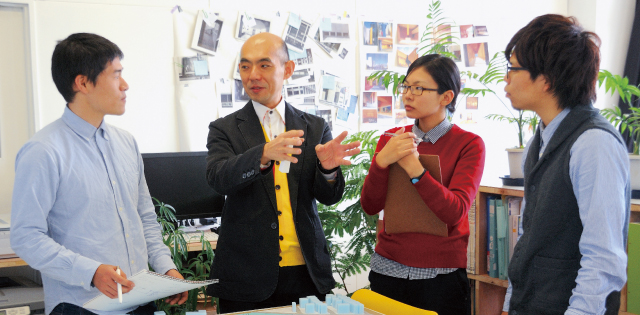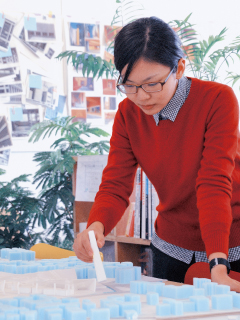
Architecture and Architectural Engineering
Architecture is a whole spectrum of technologies we humans use to organize and create space for various purposes. The Architecture program is divided into three courses: Architectural Planning, Building Environment, and Building Structure. The course takes over from the undergraduate curriculum and offers comprehensive education and research opportunities.
Educational Goals (Philosophy) and Prospective Students
Our goal is to educate students who have the ability to identify and solve problems, to master the basic academic skills necessary to experiment and analyze, to apply the results of research to their specialized fields and beyond, and to collaborate broadly with different fields so that they become self-reliant scientists, engineers, or researchers in the architectural profession. We welcome individuals with basic scholastic ability and willingness to seek advanced and specialized training through the education and research provided through the Architecture Course.

Admission Policy
We aim to develop professionals and specialists who can inherit humanity’s architectural culture and technology, and with consideration for the preservation of the environment take on the responsibility of using advanced technology comprehensively to create and maintain architectural spaces and our living environments.
Prospective Students
- Those who take the initiative to create an environment that can bring out the best of human nature.
- Those who are good communicators and team players ready to take action on their own initiatives.
- Those who can conceptualize ideas to make them reality and those with the ability to identify and solve problems.
Course Work
◎Architectural Design Course
Education and research fields: Architectural Design for Diverse Use, Urban Landscape Improvement and Preservation of Historical Environments, Improvement of Living Environments and Welfare Environments through Practical Activities in the Region.

◎Environmental Design Course
Through Environmental Design, students will study and research heating and lightning of living environments, along with indoor environmental control such as air quality, and utilities and equipment used within a building.

◎Structural Design Course
Through Structural Design, students will research and study structural mechanics, load evaluation, evaluation of structural performance, structural optimization, building materials, and construction engineering.
Architectural Design Work Experience Program
The eligibility requirements for the Architect Examination were changed when the Architect Act was revised in November 2008. Accordingly, the practical experience criteria at the graduate school were also modified. The Architectural Design Work Experience Program was introduced in April 2009 for all three courses (Architectural Design, Structural Design, and Environmental Design). Students will be able to obtain up to two years of practical work experience, depending on the number of credits earned.
Curriculum
◎Architectural Design Course
The Architectural Design Seminar is a studio class focusing on architectural, city/town and community planning, and other practical design work. Students will cultivate creativity, train their ability to make comprehensive decisions, and acquire diverse and practical skills in architectural design.
“Advanced Architectural Design I and II,”in contrast to studio work, are classes that give students an opportunity to acquire the necessary viewpoints, techniques, technology, and a wide range of knowledge necessary to design buildings and plan cities through architecture.

◎Environmental Design Course
The Environmental Design Seminar develops students’practical abilities in assessing the overall environmental quality of a building’s interior and exterior surroundings from the viewpoints of energy efficiency, ease of use, resource efficiency, artistic effect, and many other various aspects. The Advanced Environmental Design class will provide students with the knowledge and skills necessary to perform comprehensive environmental quality assessment.

◎Structural Design Course
To design a structure, it’s necessary to make complete use of a variety of knowledge and techniques. Through the Seminar for Advanced Structural DesignIand II, students will develop the comprehensive ability to design structures, assess external force, perform stress deformation analysis, design infrastructure along with various other structures in structural design. Advanced Structural DesignIand II will provide students with the crucial knowledge and skill required to study structural design.
List of faculty members
The following specialists provide research and education support to students and help find solutions to student academic issues.
